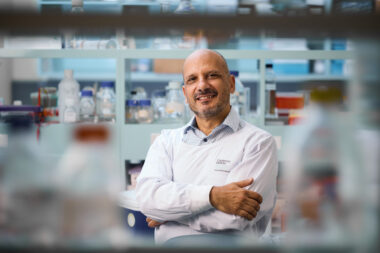· Sleep for bushfire survivors
· Cane waste to rebuild soil health
· The real carbon cost of your travel
· Creating tri-sector careers
Four early career researchers from Canberra, Newcastle, Sydney, Melbourne recognised by Cooperative Research Australia for their innovative research and their ability to present it clearly and simply.
“These researchers illustrate the difference that deeply collaborative research can make for Australia,” says Jane O’Dwyer, the CEO of Cooperative Research Australia.
After the fires: dealing with insomnia, nightmares and trauma
An online self-paced intervention is being trialled to treat insomnia, nightmares, and trauma symptoms in bushfire survivors. Participants are welcome.
Many survivors of bushfires have a range of disruptive long-term sleep disorders that can lead to PTSD and depression. In a sample of 126 participants, 49.2% reported clinical insomnia, 28.7% reported nightmares, and 77.88% reported trauma symptoms.
Fadia Isaac, an early career researcher with Natural Hazards Research Australia and Federation University has developed the intervention which is called Sleep Best-i. “We’re in the tenth week of a clinical trial, with promising results. We hope to make it widely available by early 2024,” says Fadia.
“I hope that Sleep Best-i will give individuals increasing self-governance, a sense of personal responsibility, and greater privacy,” says Fadia.
Fadia won the CRA Early Career Research Competition, presented by the University of South Australia.
Find out more about the Sleep Best-i trial at https://sleepwell1copy.healthzone.org.au/
The door-to-door cost of your travel
“Door-to-door air-travel emission calculator could help us realise immediate decarbonisation,” says David Li, an early career researcher with the iMove Australia Cooperative Research Centre and The University of Sydney. It’s one of a series of insights from his analysis of flights on the 40 most popular routes in the world.
“Air travel makes 2.5 per cent of global emissions. In some countries eg Switzerland, it’s already ten per cent of national emissions,” David says. An overlooked opportunity however is the adjacent ground travel (“door-to-door”). He has shown for example that average emissions flying the Sydney Melbourne route comprise 3 kg getting to the airport, 71 kg on the flight and 8 kg travelling to your final destination.
He offers some short term and long ideas for reducing aviation emissions.
- Telling travellers the carbon cost of their flight leads to an 3.8% reduction in their emissions over time without compromising their travel needs.
- Travelling to and from the airport by public transport reduces a significant proportion of their door-to-door air-travel emissions.
- The cost per passenger of sustainable aviation fuels is comparable to the premium currently paid for airport train/bus surcharges. As we await the widespread availability of these fuels, both airlines and consumers can pursue the adoption of airport train/bus and electric vehicles to achieve immediate and meaningful carbon reduction.
Growing sugar sustainably with waste and nanotech
Boosting crop production and soil health, reducing carbon emissions and pollution.
Cane growers produce (and usually burn) 5.7 million tonnes of green waste every year. Early career researcher Bhavya Mod from the Soil CRC and The University of Newcastle has shown that this green waste can be used to produce several useful soil amendments.
The first is a specialised biochar that can enrich the soil with nutrients and reduce leaching of pollutants like nitrous oxide.
The second are porous silicon nanoparticles, that can boost silicon levels in soil, reducing the need for expensive silicon fertilisers.
The combination of both of these into a single composite material will take it further and function as a slow release fertiliser and fertiliser, boosting crop productivity.
“My aim is to enhance organic soil, reduce waste and create a path to a potential circular economy model for canegrowers. In trials we’ve already shown that we can halve nitrate runoff from farms,” says Bhavya.
Tri-sector careers for research impact
Effective collaboration between industry, government and research is vital for solving grand challenges and creating impact at scale. "CRCs are an excellent example of where this works really well" says Zoe Piper, from Australian National University, "however more needs to be done to bridge the differences in language, timeframes and incentive structures between the three sectors more broadly".
Through her PhD, Zoe identified and interviewed 25 individuals who had a built a portfolio career working in industry, research and government concurrently. These tri-sector professionals were able to move seamlessly between different worlds, connecting the dots and translating across the sectors.
Drawing on boundaryless career theory and the intelligent career framework, Zoe's research uncovered learnings for both aspiring tri-sector professionals and the organisations looking to tap into the significant value they can deliver. More on her research and the network of tri-sector professionals she is building can be found at www.zoepiper.com.au
Media contacts:
Niall Byrne, 0417-131-977, [email protected].
Louise Reid, Communications and Marketing Manager, CRA, 0403-804-044, [email protected].
Conference website: https://conlog.eventsair.com/collaborate-innovate-2023/
Contact details:
Niall Byrne, 0417-131-977, [email protected].
Louise Reid, Communications and Marketing Manager, CRA, 0403-804-044, [email protected].


